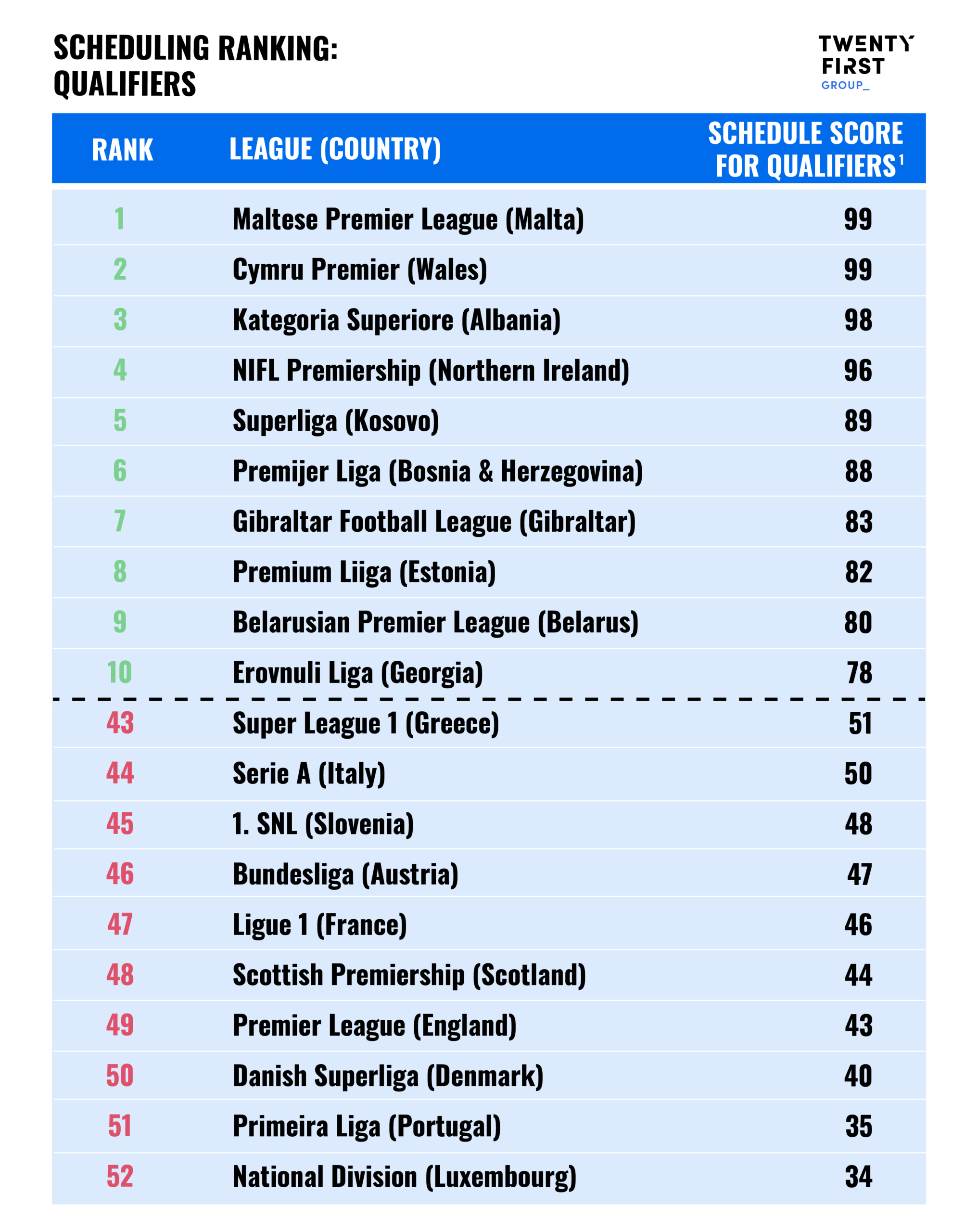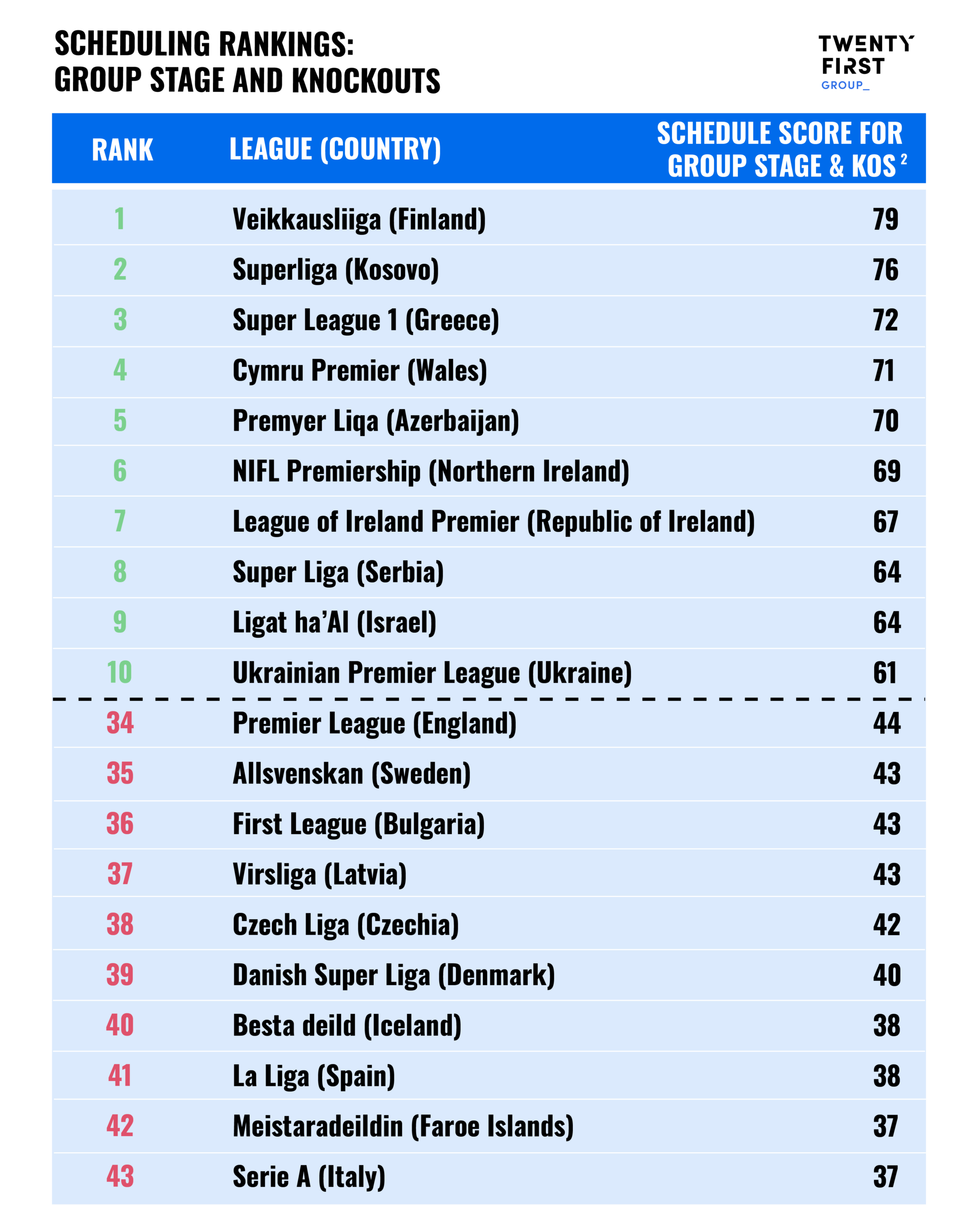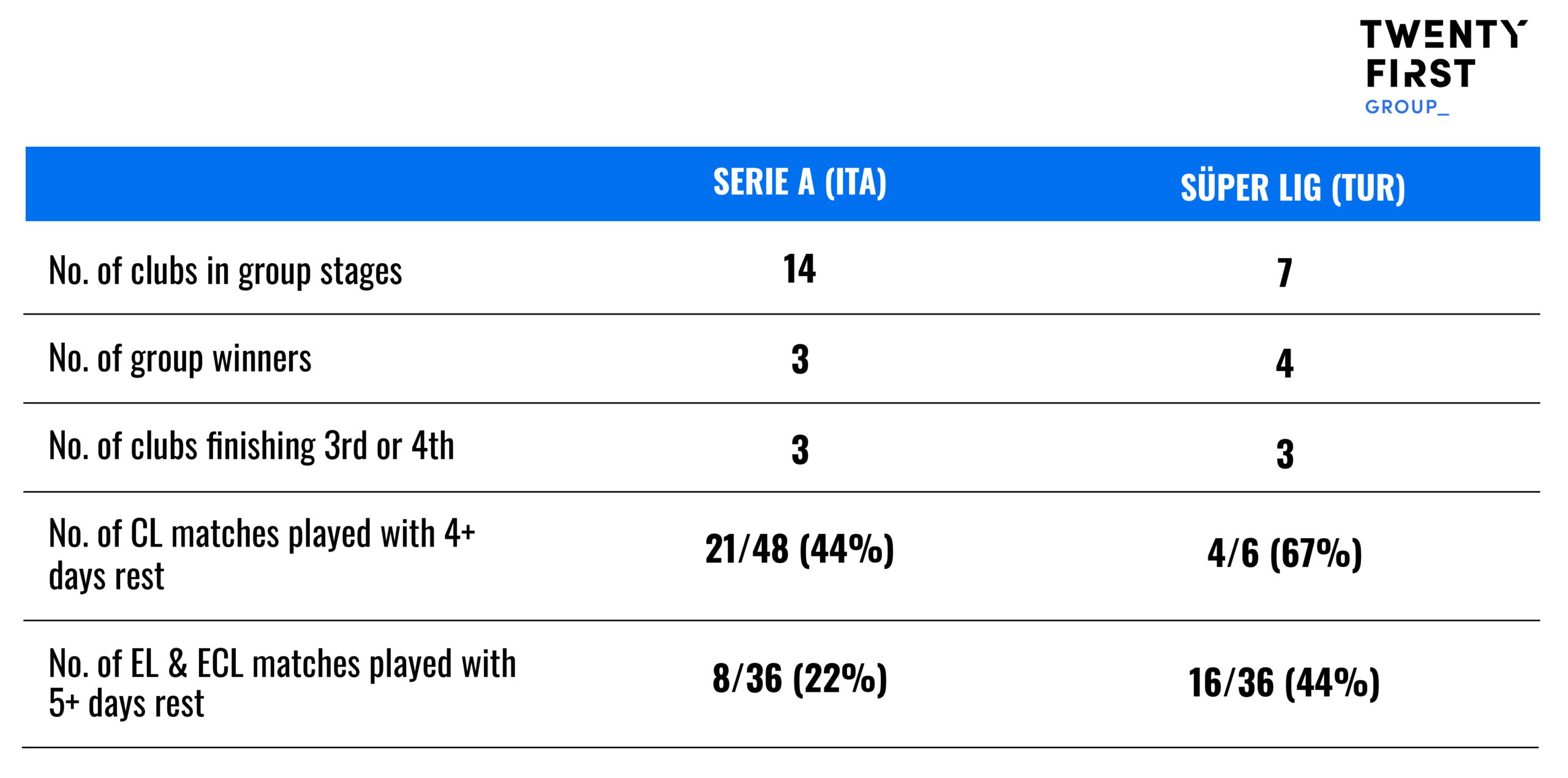Scheduling: unlocking success for clubs and leagues
With the expansion of UEFA club competitions, more teams than ever have the chance to compete on the European stage. As a result, UEFA coefficient rankings have become even more critical for clubs and leagues. A higher ranking, achieved through better results, increases clubs’ access to top competitions and ultimately strengthens the domestic league, notwithstanding concerns about the distortive effect of prize money on competitive balance.
One often overlooked factor in improving a league’s UEFA coefficient is the impact of domestic scheduling on clubs competing in Europe. This can be difficult to get right and it must be balanced against a league’s own commercial commitments – take, for example, Guardiola’s recent suggestion that Premier League scheduling doesn’t favour English clubs in Europe. Nevertheless, some leagues have made a conscious effort to support their teams ahead of European matches in two key ways: by postponing fixtures or ensuring minimum rest periods to enhance preparation, and by reducing the difficulty of domestic opposition. Our rankings compare the steps leagues take to support their clubs’ performance in UEFA competitions by looking at two tangible measures:
- Rest days: the average number of rest days given to teams between domestic and European fixtures
- Quality of opposition: the relative quality of domestic opposition played by teams ahead of European fixtures, based on TFG’s World Super League team strength model
We have produced two separate rankings – one evaluates how leagues support their clubs for European qualifiers, while the other assesses their support for clubs ahead of European group stage and knock-out matches, both covering the past three seasons inclusive of 2024/25.
European qualifiers
As demonstrated by our qualifiers rankings, leagues lower in the UEFA coefficient rankings often provide the most support to their teams during qualifiers, as they stand to gain the most. For instance, the Bosnian, Welsh, and Northern Irish leagues have helped clubs prepare for crucial qualifiers by both scheduling ‘easier’ opponents beforehand and, more commonly, postponing matches. This approach has led to historic successes, with Zrinjski Mostar, The New Saints, and Larne all becoming their nation’s first-ever representatives in European group stages over the past two seasons. These achievements have not only brought increased revenue to the clubs but also boosted their nations’ UEFA coefficients, benefiting their leagues overall.
In contrast, several mid-tier leagues have not used scheduling as a strategic tool, impairing their clubs’ preparation for crucial qualifiers and the chances of improving UEFA coefficients. For example, the Scottish and Danish leagues offer little scheduling flexibility, and their clubs have struggled in qualifiers recently, contributing to a decline in their UEFA coefficient rankings. This season, for example, Scottish clubs Rangers and Hearts lost their final qualifying ties to opponents who benefited from extra rest via Friday fixtures and postponements. While postponing matches can be challenging due to fixture congestion, leagues could adjust schedules to ensure clubs competing in qualifiers receive a minimum rest period or avoid tough opposition, giving them a better chance to perform in Europe. Group-stage qualification benefits the entire league by boosting UEFA coefficients, which in turn leads to more qualification spots, better seeding, and increased financial rewards, creating a virtuous cycle. Failing to address this risks long-term competitiveness in Europe.
European group stages and knock-outs
For much of the season, clubs in European tournaments must balance domestic league duties with midweek fixtures. As Guardiola noted, a league’s schedule can enhance or detract from clubs’ chances of success. Our group stage and knock-outs rankings show that leagues with lower UEFA coefficients and fewer clubs in European group stages tend to offer more domestic scheduling support to their clubs. With fewer clubs to accommodate, ensuring teams are well rested is easier. In contrast, top UEFA ranked leagues face greater challenges – more teams in Europe and stricter broadcasting commitments may reduce the options available to the league from a scheduling perspective.
Nevertheless, these leagues can still use scheduling to support their clubs’ European endeavours, as the differing approaches of the Turkish and Italian leagues illustrate. Among the top 10 leagues by UEFA coefficient, Italy ranks lowest in scheduling support (43rd of 43 overall), while Turkey ranks highest (23rd of 43). In the 2022/23 and 2023/24 seasons, when UEFA group stages comprised six matches, Turkish clubs typically enjoyed more rest before European fixtures than their Italian counterparts – a key advantage. For example, in last season’s Champions League, Galatasaray averaged 3.9 days’ rest compared to AC Milan’s 3.4. In addition, Italian clubs often face tougher domestic opposition before European matches than their Turkish counterparts. Ahead of their six group stage fixtures last season, AC Milan played Inter, Lazio, Juventus, Udinese, Fiorentina and Atalanta – losing four of these matches – whereas Galatasaray faced relatively ‘easy’ opposition, including three sides that eventually finished in the bottom half of the table, and won all six. Ultimately, these contrasting approaches appear to have enabled Turkish clubs to match the group-stage performance of their Italian counterparts, despite having fewer representatives in Europe.
A critical strategic lever
In the race for European football supremacy, success is not only determined by the quality of players and teams on the pitch, but also by the thoughtful and strategic decisions made off it. The evidence suggests that leagues can enhance their teams’ chances in Europe by adopting more supportive domestic scheduling practices. Whether through postponing fixtures, providing a minimum rest period, or preventing the scheduling of particularly taxing domestic matches, these measures can be a powerful tool to ensure that clubs are given the best possible chance to succeed in UEFA competitions. By failing to optimise their schedules, leagues risk undermining their teams’ potential and, consequently, their own long-term competitiveness on the European stage. With the growing financial rewards tied to success in these competitions, it is clear that adopting such strategies can pay dividends, not only for individual clubs, but for entire leagues aiming to improve their UEFA coefficient and bolster their reputation in European football.
Twenty First Group are experienced in collaborating with leagues to produce an optimised schedule – if you would like to learn more about our scheduling services, please get in touch with Ben Marlow at ben@twentyfirstgroup.com







